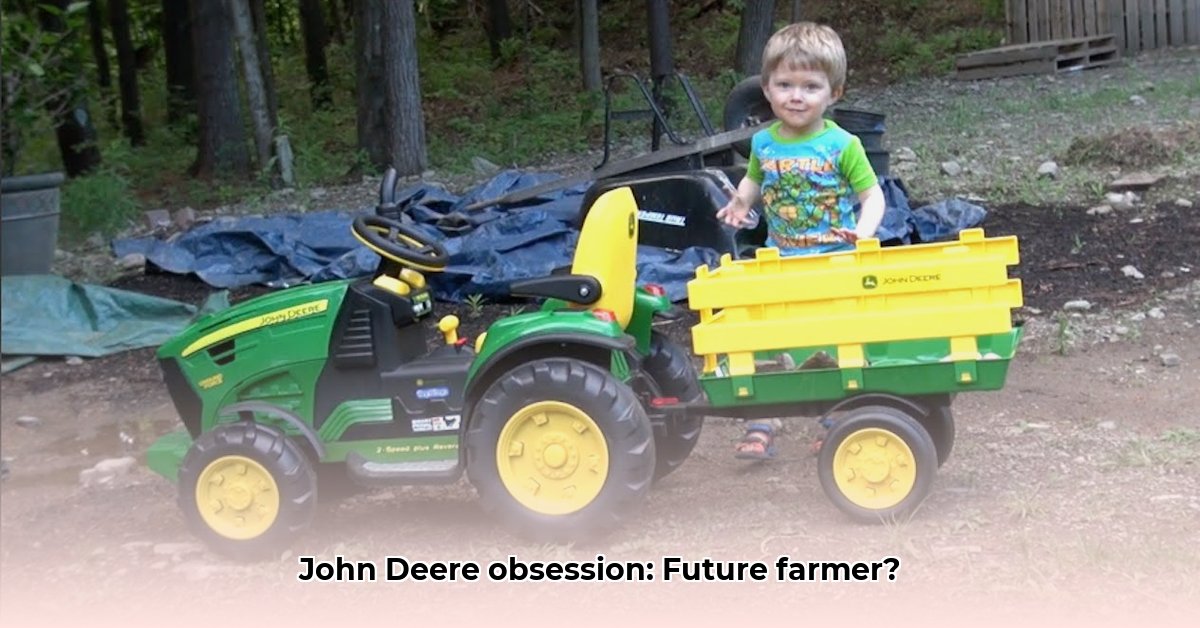
Little Boy Talking About John Deere Tractors: A Seed of Hope for Farming's Future?
Eight-year-old Jackson's viral TikTok videos, brimming with his encyclopedic knowledge of John Deere tractors, are more than just a cute online phenomenon. They represent a potential spark—a renewed interest in farming among young people, a critical demographic for the future of sustainable agriculture. But can this passion translate into a viable career path? The challenges are significant, but so is the potential.
Is Jackson's enthusiasm a fleeting trend or a harbinger of a revitalized agricultural sector? The answer lies in addressing the real-world hurdles facing aspiring young farmers. According to the USDA, the average age of farmers in the US is steadily increasing. This points to an urgent need for a younger generation to step up and embrace agriculture.
The Rocky Road to Sustainable Farming: More Than Just Tractors
While Jackson's love for John Deere is undeniably charming, the reality of sustainable agriculture is complex. The upfront investment is staggering. The average cost to start a small farm can easily exceed $100,000, a significant barrier for young people. Land acquisition presents another steep hurdle, with land prices soaring in many areas. And beyond financial constraints, sustainable farming demands a vast skillset—from soil science and precision agriculture to marketing and environmental stewardship.
Planting the Seeds of Change: Actionable Steps to Support Young Farmers
To cultivate the passion exemplified by Jackson, a multifaceted strategy is essential:
Boosting Agricultural Education: Comprehensive educational programs, including hands-on workshops and farm-based apprenticeships, are crucial. These programs must be accessible, engaging, and adaptable to diverse learning styles. "We need to move beyond textbook learning and create immersive experiences," says Dr. Emily Carter, Professor of Agricultural Economics at Cornell University.
Financial Support Mechanisms: Micro-grants, low-interest loans, and tax incentives can provide the crucial "seed funding" to launch young farmers' careers. "Targeted financial support is vital for overcoming the significant financial barriers to entry," explains Mr. David Miller, Senior Policy Advisor at the USDA.
Mentorship Programs: Connecting seasoned farmers with aspiring young agriculturists creates valuable learning and support networks. Mentors provide guidance on farming techniques, business management, and the emotional support necessary to navigate the challenges of farming.
Leveraging Technology: Precision agriculture and automation can significantly boost efficiency and sustainability, often reducing costs. Making these technologies more accessible and affordable to small farms is key. "Technology can be a game-changer, but only if it's accessible," states Ms. Sarah Chen, Director of Sustainable Agriculture at the World Resources Institute.
Success Stories: Proof That Change is Possible
Despite the numerous challenges, successful youth engagement programs in agriculture demonstrate that investment in young people yields substantial results. These programs provide tangible evidence that with the right support, the next generation of farmers can thrive. Their success stories serve as blueprints for broader replication.
Social Media's Double-Edged Plow: Harnessing the Power of the Internet
Platforms like TikTok have amplified Jackson's story, broadening awareness of the issues facing young farmers. However, it's crucial that this online enthusiasm translates into concrete action and tangible support, avoiding the creation of unrealistic expectations.
Investing in the Future: More Than Just a Viral Trend
Jackson's story underscores a pivotal opportunity. By investing in education, providing financial assistance, fostering mentorship, and embracing technological advancements, we can cultivate the passion of young people like him and secure a sustainable agricultural future. Let's not let this moment pass.